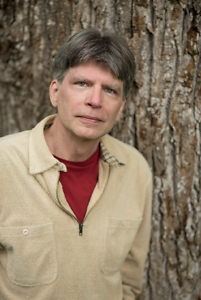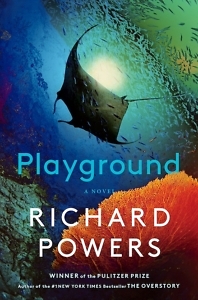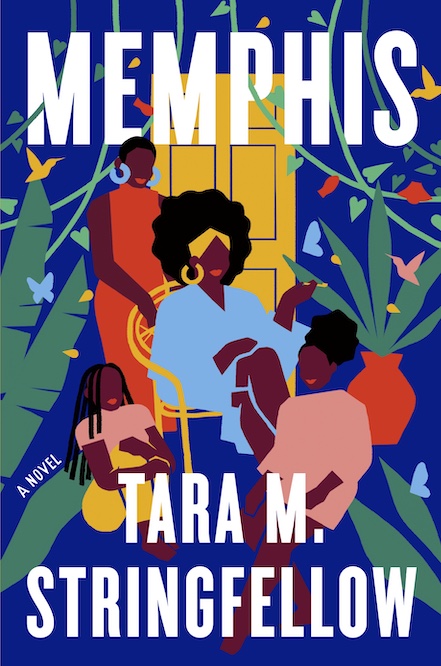The Depths
Playground brings Richard Powers’ inimitable storytelling to the world of Earth’s oceans
In his recent novels The Overstory and Bewilderment, Pulitzer Prize winner Richard Powers invites us to set down the blinkered limitations of human perspectives and connect to the natural world in deeper, more urgent ways. Now, with Playground, Powers brings his inimitable storytelling to Earth’s subterranean depths, illuminating the abundant riches of our oceans and the critical dangers they face.

Like The Overstory — which enveloped us in mysteriously powerful relationships between trees and humans — Playground swirls together an interrelated ecosystem of human characters with the teeming wealth of ocean life, immersing us in a boundless sense of wonder at the wilder nonhuman world around us.
Or, below us, in this case. Playground alerts us to the vastness of what we don’t know about our oceans, which comprise the significant majority of Earth’s biosphere. In a compelling sequence depicting Canadian diver Evelyne Beaulieu’s first adventure on a deep-sea scientific vessel, Evelyne stands on deck late at night: “She looked out on the black swells and understood. Every main branch of taxonomy was there beneath the waves she floated on, while only a few had made it up onto the land. The mainspring of life would go on ticking, driving the gears of evolution, oblivious to anything that humans got up to above the surface.”
Each of Playground’s central characters must confront unknown depths of his or her own particular kind. Evelyne pursues her inexhaustible love for the ocean against the confusing demands of being a woman in the mid-20th century. Sculptor Ina Aroita seeks belonging through art-making as her family moves from one naval base to another throughout the Pacific.
Two boys navigate complicated Chicago upbringings through their mutual fascination with games. Rafi Young finds solace and freedom in literature, and Todd Keane turns to computers, becoming an influential figure in AI technology. Over the years, their friendship pushes them into vulnerable terrain, challenging them to voice what they’re learning about the mysteries and possibilities inherent in the moves human beings make, the nature of the lives they try to build.
 Decades on, as he faces a devastating health diagnosis, Todd reflects on the legacy of a lifetime’s choices: “We make things that we hope will be bigger than us, and then we’re desolate when that’s what they become.”
Decades on, as he faces a devastating health diagnosis, Todd reflects on the legacy of a lifetime’s choices: “We make things that we hope will be bigger than us, and then we’re desolate when that’s what they become.”
Playground brings all of these characters into the heart of a conflict taking place on an island called Makatea, a tiny coral atoll in French Polynesia with a fraught history marked by colonialism and phosphorous mining. Now Makatea’s small population faces an unexpected choice: American venture capitalists propose an ambitious vision of floating cities made from modular parts. And they want to launch this “seasteading” project off the coast of Makatea.
The islanders must vote on whether or not to let their home become the staging ground for a new phase of human innovation (and possible exploitation). This vote provides Powers with a narrative opportunity to pose questions about what humankind faces next as a result of the rapidly changing conditions of life on our planet. What are we willing to trade in the near future for a shot at possible long-range solutions to climate crisis? And who has the rightful standing to make such decisions on our behalf?
Powers, who relocated to the Great Smoky Mountains as a result of his immersive commitment to writing The Overstory, has a gift for crafting characters who are driven by intense, single-minded devotion to nature’s abundance. In order for these novels to penetrate our everyday complacency and reveal the astounding richness of our planet, we must be willing to follow these unusual characters into the far reaches of their obsession — and to stay there until our perspectives shift and expand.
Evelyne experiences this epiphanic shift as she observes a coral reef up close for the first time: “She hung suspended in the middle of reefs that mounded up in pinnacles, domes, turrets, and terraces. She was a powerless angel hovering above a metropolis built by billions of architects almost too small to see. At night, with underwater lights, when the coral polyps came out to feed, the reef boiled over with surreal purpose, a billion different psychedelic missions, all dependent on each other.”
Powers’ signature approach offers a specific blend of scientific detail and emotional potency that brings to mind filmmaker Akira Kurosawa’s famous assertion: “To be an artist means never to avert one’s eyes.” Playground insists upon that wide-eyed attentiveness.

Emily Choate is the fiction editor of Peauxdunque Review and holds an M.F.A. from Sarah Lawrence College. Her fiction and essays have appeared in Mississippi Review, storySouth, Shenandoah, The Florida Review, Rappahannock Review, Atticus Review, Tupelo Quarterly, and elsewhere. She lives near Nashville, where she’s working on a novel.


